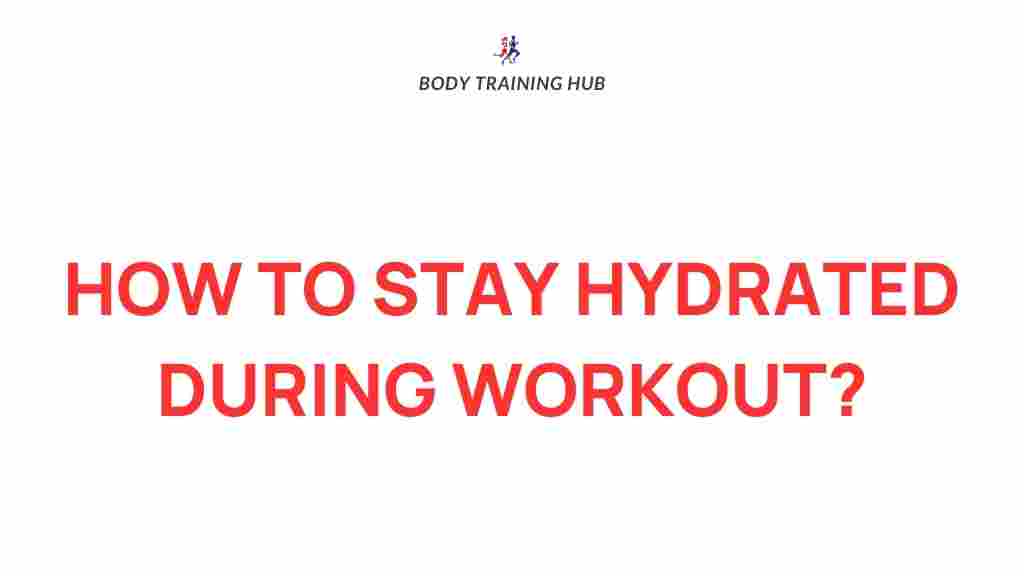Unlocking the Secrets to Optimal Hydration for Peak Performance
When it comes to achieving peak performance in your workouts, one of the most crucial yet often overlooked factors is hydration. Whether you’re a seasoned athlete or a fitness enthusiast, understanding the role of hydration in your exercise routine can significantly impact your overall health and performance. In this comprehensive guide, we will explore essential tips for maintaining optimal hydration, the importance of water and electrolytes, and how you can enhance your endurance during workouts.
Why Hydration Matters for Performance
Hydration is vital for numerous bodily functions, particularly when it comes to physical performance. Water makes up about 60% of your body weight and plays a critical role in:
- Regulating body temperature
- Transporting nutrients to cells
- Removing waste products
- Lubricating joints
During exercise, your body loses water through sweat and respiration. If you do not replace this lost fluid, you risk dehydration, which can lead to:
- Decreased endurance
- Fatigue
- Muscle cramps
- Heat exhaustion
In essence, proper hydration not only supports your health but also enhances your fitness performance. Thus, prioritizing hydration is essential for anyone looking to improve their workout results.
Tips for Optimal Hydration
Here are some practical tips to ensure you stay hydrated before, during, and after your workouts:
1. Start Your Day with Water
Begin your day by drinking a glass of water. This helps kickstart your metabolism and prepares your body for the day ahead. Aim for at least 16 ounces of water as soon as you wake up.
2. Monitor Your Fluid Intake
Keep track of how much water you consume throughout the day. A good target is to drink at least half your body weight in ounces. For example, if you weigh 150 pounds, aim for 75 ounces of water daily.
3. Hydrate Before Workouts
Drink water before you start exercising. Aim to consume about 16-20 ounces of water at least 1-2 hours before your workout. This will help ensure that your body is well-hydrated.
4. Stay Hydrated During Exercise
During your workout, aim to drink about 7-10 ounces of water every 10-20 minutes, especially if you’re engaging in intense or prolonged activities. For longer workouts, consider electrolyte beverages to replenish lost minerals.
5. Rehydrate After Workouts
After exercising, it’s crucial to replenish lost fluids. Drink at least 16-24 ounces of water for every pound lost during your workout. You can weigh yourself before and after exercising to gauge your fluid loss.
The Role of Electrolytes
While water is essential, electrolytes also play a critical role in hydration and performance. Electrolytes, such as sodium, potassium, magnesium, and calcium, help maintain fluid balance and muscle function. Here’s how to incorporate them into your hydration plan:
- Choose Electrolyte-Rich Foods: Foods like bananas, oranges, spinach, and yogurt are great sources of potassium and magnesium.
- Use Electrolyte Supplements: If you’re sweating heavily during workouts, consider using electrolyte tablets or powders mixed with your water.
- Drink Coconut Water: This natural beverage is rich in electrolytes and can be an excellent post-workout recovery drink.
Hydration and Endurance: Finding the Balance
Endurance athletes, in particular, must pay close attention to hydration. The longer you exercise, the more fluids and electrolytes you’ll need. Here are some tips for maintaining hydration during endurance activities:
1. Pre-Workout Hydration Strategy
For endurance events, start hydrating well in advance. Begin drinking more water 24-48 hours prior to the event, and consume electrolyte beverages as needed.
2. Hydration During Long Workouts
For workouts lasting longer than an hour, consider a hydration plan that includes both water and sports drinks. Aim for a balanced intake of fluids and electrolytes to sustain energy levels.
3. Post-Workout Recovery
After long training sessions, prioritize recovery hydration. Consume fluids that replenish both water and electrolytes, such as recovery shakes or specially formulated electrolyte drinks.
Common Hydration Mistakes to Avoid
Even with the best intentions, many people make hydration mistakes that can affect their workout performance. Here are some common pitfalls to watch out for:
- Ignoring Thirst: Don’t wait until you feel thirsty to drink water. Thirst is often a sign that your body is already dehydrated.
- Overhydrating: While it’s essential to stay hydrated, drinking excessive amounts of water can lead to a rare but serious condition known as hyponatremia, where sodium levels drop dangerously low.
- Relying Solely on Sports Drinks: While sports drinks can be beneficial, they also often contain sugar and calories. Balance your intake with plain water when appropriate.
Hydration Myths Debunked
Misconceptions about hydration can lead to poor choices. Here are a couple of common hydration myths:
- Myth 1: “You only need to hydrate when exercising.”
- Myth 2: “All fluids are equally hydrating.”
In reality, maintaining hydration is a daily effort, and while other beverages contribute to hydration, water should remain your primary source.
Conclusion: Make Hydration a Priority
In summary, hydration is a key component of achieving peak performance in your workouts. By understanding the importance of water and electrolytes, implementing effective hydration strategies, and avoiding common pitfalls, you can significantly enhance your exercise performance. Remember, your body needs adequate hydration to function optimally, so make hydration a priority in your health and fitness journey.
For more tips on enhancing your fitness routine, check out our detailed guides on fitness and nutrition. And if you’re interested in learning more about how hydration affects overall health, visit this informative resource.
Stay hydrated, stay healthy, and unlock your full potential in every workout!
This article is in the category Cardio & Endurance and created by BodyTraining Team
